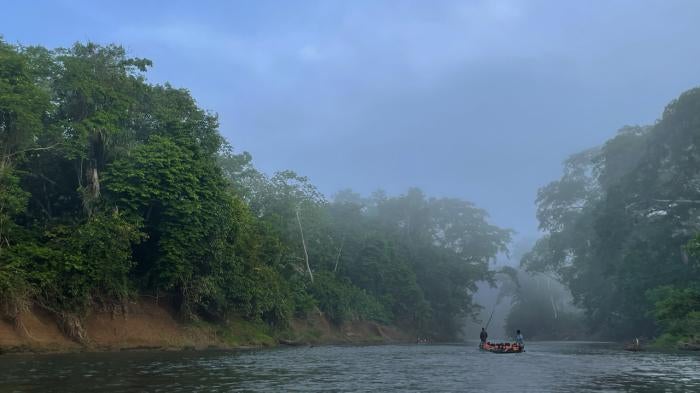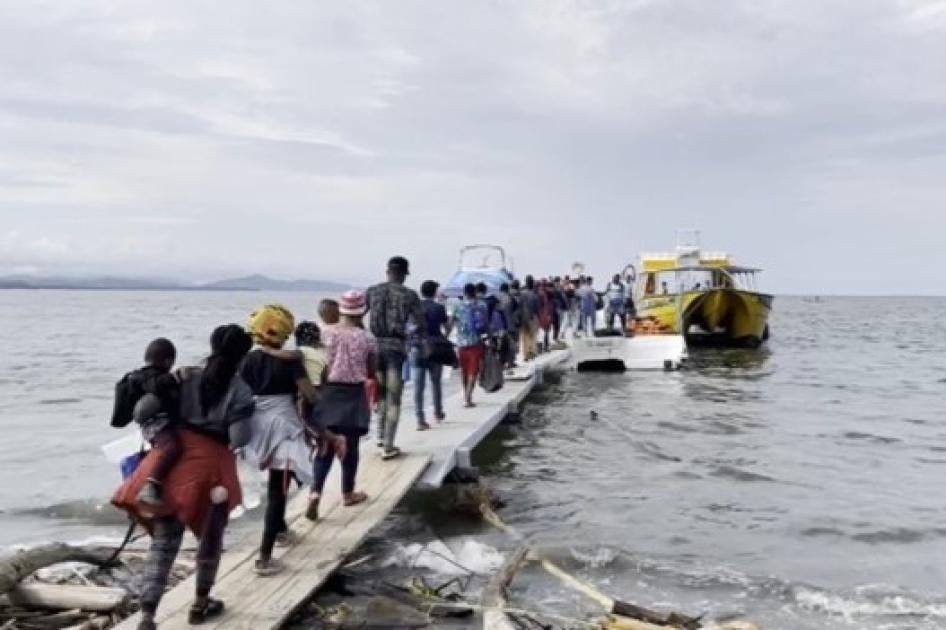- Movement restrictions, often promoted by the United States, have pushed migrants and asylum seekers to cross the Darién Gap, exposing them to abuse and empowering organized crime.
- The devastating stories of abuses of people who try to cross the Darién Gap are the result of failed immigration policies that push people into danger.
- Governments in the Americas should take steps towards ensuring rights-respecting immigration policies, including by increasing safe and legal pathways for migration and ensuring access to asylum.
(Washington, DC) – Restrictions on movement imposed by governments in the Americas have pushed migrants and asylum seekers to risk their lives crossing the Darién Gap, a swampy jungle at the Colombia-Panama border, Human Rights Watch said in a report released today.
The 62-page report, “‘This Hell Was My Only Option’: Abuses Against Migrants and Asylum Seekers Pushed to Cross the Darién Gap,” is the first in a series of Human Rights Watch reports on migration via the Darién Gap. Human Rights Watch found that restrictions on movement from South American countries to Mexico and Central America, often promoted by the United States government, have helped contribute to sharp increases in numbers of people crossing the Darién Gap. This exposes migrants to abuses, including sexual violence, and empowers organized crime in the area.
“The devastating stories we heard in the Darién Gap are the result of failed immigration policies that push people into danger and abuse,” said Juanita Goebertus, Americas director at Human Rights Watch. “The increasing immigration challenges in our region require new, region-wide policies that ensure the rights of people on the move.”
Over the last year, over half a million people have crossed the Darién Gap on their journey north, often to the United States, fleeing human rights crises in the Americas, including violence and persecution, and escaping poverty. Venezuelans, Haitians, and Ecuadorians, along with people from other regions like Asia and Africa, risk their lives in this difficult terrain.
Since January 2022, over 440,000 Venezuelans have crossed the Darién Gap, the largest number for any nationality. They are fleeing an ongoing humanitarian emergency in their country, which has undermined access to food and medicine, as well as abuses and persecution by security forces, armed groups, and gangs.
Human Rights Watch visited the Darién Gap four times between April 2022 and June 2023 and interviewed almost 300 people to document the drivers and responses to this crisis. Those interviewed included migrants and asylum seekers who had or were about to make the crossing, victims of serious abuses, aid workers, Colombian and Panamanian authorities, and migration experts from across the region. Researchers also reviewed data and reports by the Colombian, Panamanian, and US governments; UN agencies; international, regional, and local human rights and humanitarian organizations; and local legal clinics.
Human Rights Watch found that visa requirements imposed by Mexico and Central American governments contribute to the increase in migrants crossing the Darién Gap. Following the imposition of visa requirements by some of these countries for Venezuelans and Ecuadorians in 2021 and 2022, the numbers of people of both nationalities crossing the Darién Gap have skyrocketed, suggesting a cause-and-effect relationship.
During their days-long walk across the gap, migrants and asylum seekers of all nationalities frequently experience robbery and serious abuses, including sexual violence.
On the Colombian side of the Darién Gap, the Gulf Clan, an armed group involved in drug trafficking, regulates the routes that migrants and asylum seekers can use, decides who can assist them on the way, extorts people who benefit from migrant flows, and establishes rules of conduct for locals and migrants alike, at times enforcing these rules through violence. The Colombian military estimates that the Clan collects, on average, US$125 per person crossing the Darién Gap. If the estimate is accurate, the armed group may have made a total of US$57 million between January and October 2023 from its control over this migration route.
Criminals and bandits prey upon migrants and asylum seekers as they cross the many routes through the jungle, especially on the Panamanian side. People are routinely robbed, sexually abused, and at times raped. Médecins Sans Frontières (MSF or Doctors without Borders) has assisted 950 people, most of them women, who reported sexual violence crossing the Darién Gap since April 2021.
In May 2022, armed men ambushed a group of migrants, including a 22-year-old Haitian woman travelling with her husband and 1-year-old son. The men separated her and two other women from the group. One man shoved her against a tree and sexually assaulted her, she said. A second man joined in the assault, asking her where the money was. She pointed to her boots. They took all the money she had stored there and let her go.
Governments in the Americas should implement rights-respecting immigration policies that build on the Los Angeles Declaration on Migration and Protection, signed by 21 states in 2022. They should seize the upcoming 40th anniversary of the 1984 Cartagena Declaration, a landmark international instrument on refugees’ rights in Latin America, to respond to the increasing migration challenges in the region.
Governments should put in place a region-wide temporary protection system that would grant all Venezuelans and Haitians legal status for a reasonably timed and renewable term and ensure that their visa requirements do not effectively prevent access to asylum and push people to resort to dangerous crossings, including the Darién Gap, Human Rights Watch said.
Governments should also take steps toward creating an equitable and rights-focused regional mechanism to determine the responsibility of countries to examine asylum claims and protect refugees, considering individual factors, like social or family ties and individual choices, to the extent possible. Governments should distribute costs equitably and offer member states incentives for sharing responsibility, Human Rights Watch said.
“Whether fleeing persecution or seeking economic opportunities, migrants and asylum seekers deserve safe and dignified ways to move,” Goebertus said. “They are all entitled to basic safety and respect for their human rights during their journey.”









